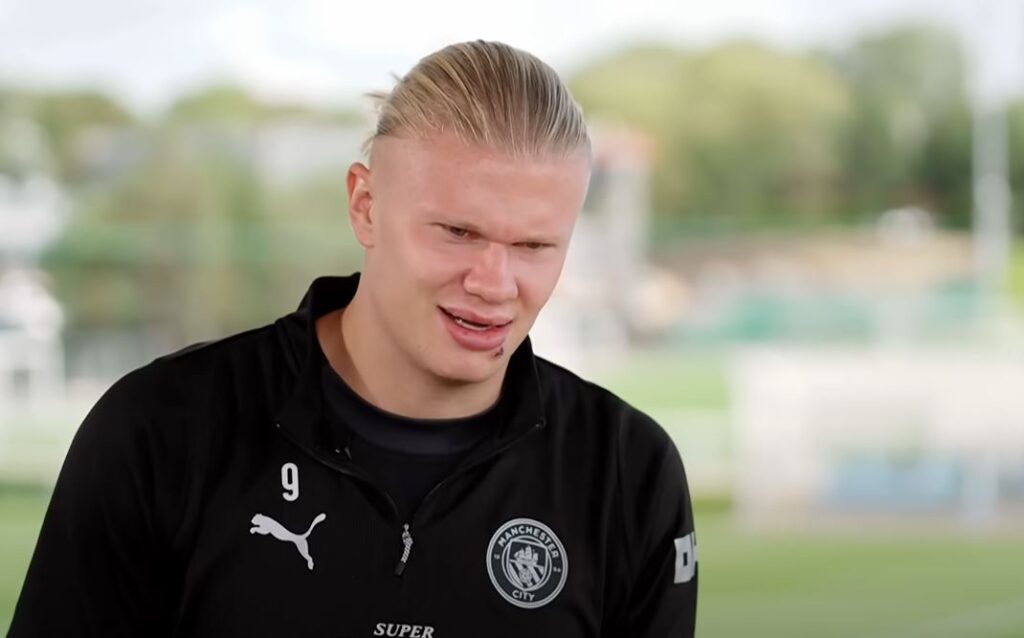
Erling Haaland’s weekly salary, which stands at an incredible £525,000 and could increase to £875,000 with performance-related bonuses, has become a defining figure in contemporary football finance. Many observers now see his wages as a reflection of how football has become an economic engine rather than as excessive because the number itself is so strikingly similar to the corporate bonuses given out in elite finance.
Manchester City successfully created a buffer around their most valuable asset by securing Haaland until 2034. His weekly wages, which are incredibly successful at discouraging rivals like Real Madrid, act as a kind of strategic investment, guaranteeing that goals, trophies, and income streams will all be rooted at the Etihad for the ensuing ten years.
| Category | Details |
|---|---|
| Full Name | Erling Braut Haaland |
| Date of Birth | July 21, 2000 (Age 25 in 2025) |
| Birthplace | Leeds, England (raised in Norway) |
| Nationality | Norwegian |
| Position | Striker (Centre-Forward) |
| Current Club | Manchester City FC |
| Weekly Salary | £525,000 ($663,000), with bonuses up to £875,000 |
| Annual Salary | ~£27.3 million ($34.5 million) |
| Contract | Until June 2034, worth £245 million+ |
| Major Honours | Premier League, Champions League, FA Cup, UEFA Nations League finalist |
Haaland earns over £27 million a year, which is comparable to the salaries of Silicon Valley executives or Hollywood A-listers. To put it another way, he makes about $4,000 per hour. Comparing that rate of accumulation to peers, such as Mohamed Salah’s £350,000 per week at Liverpool or Cristiano Ronaldo’s £3.8 million per week in Saudi Arabia, has made it glaringly obvious, but Haaland’s worth comes from both his influence and his income.
Haaland’s first season since joining from Borussia Dortmund in 2022 resulted in 52 goals and a treble, which significantly raised City’s commercial profile. International fan interaction increased, shirt sales skyrocketed, and broadcasters reported record attendance at matches that featured his deadly finishing. City’s investment has been extremely effective by taking advantage of this superstar effect, which translates athletic dominance into business growth.
The disparity is equally evident within Manchester City’s own pay structure. Jack Grealish and Bernardo Silva each receive £300,000 a week, while Kevin De Bruyne, the team’s creative center, earns £400,000. Haaland’s high salary bracket indicates both his youth and extraordinary potential, which help to explain the pay disparity and show how teams now value longevity just as highly as current performance.
However, Haaland continues to lag behind football players drawn to Saudi Arabia’s Premier League on a global scale. Riyad Mahrez, Karim Benzema, and Cristiano Ronaldo all sign contracts that are frequently short-term and associated with the end of their careers, but they all earn enormous sums of money that are far beyond European structures. At just 25, Haaland is a symbol of the future, and his contract is an especially creative strategy: a long-term collaboration that strikes a balance between financial strength and long-term planning.
The size of Haaland’s salaries may draw criticism, particularly in cultures where public services are underfunded. But customer demand shapes the reality. His earnings are drastically reduced to a straightforward supply and demand equation, as evidenced by the millions of people who purchase merchandise, subscribe to platforms, and travel great distances to watch him play. Haaland consistently delivers the spectacle that fans pay for.
This phenomenon is known to economists as the “superstar effect.” Rewards are disproportionately high even when there is only a slight advantage at the top. Because of his speed, finishing, and physical presence, Haaland is not only slightly superior to his competitors but also noticeably quicker and stronger in ways that are important to business. The willingness to pay reflects the fact that clubs and broadcasters are aware that his name sells everywhere, from Oslo to Osaka.
Haaland’s weekly salary has symbolic significance in addition to economic considerations. His success story is especially helpful to young Norwegians as it raises the country’s sporting profile. Like Zlatan Ibrahimović for Sweden, he has become a cultural ambassador, representing the idea that small countries can produce giants who can wield extraordinary influence.
The fact that City extended his contract until 2034 shows that they see him as a brand partner in addition to a player. The club uses his notoriety to expand academies, find new sponsors, and break into markets previously controlled by Italian or Spanish teams through strategic alliances. This endeavor is streamlined by Haaland, who is immensely adaptable as a striker and a world ambassador.
Similar patterns can be seen when comparing athletes from different sports. Max Verstappen in Formula One has been linked to billion-dollar estimates, Juan Soto in baseball signed a $765 million contract, and Patrick Mahomes in the NFL signed a $500 million deal. When factored into his ten-year contract, Haaland’s weekly salary puts him squarely in the pantheon of cross-sport superstars.
But his influence goes beyond statistics. Manchester City has become a club whose appeal goes well beyond trophies thanks to Haaland’s transformation of the team’s image. His charisma, modesty, and unwavering determination produce stories that are very effective at retaining followers. His remarks about City being a “special club” ring true as pledges supported by on-field performance rather than as platitudes.
One day, Haaland’s weekly pay could be seen as a turning point for football as a whole. It illustrates how social media reach and streaming platforms are enabling a sport to transition from local competition to worldwide entertainment. Although the pay of up-and-coming talent may increase even more in the years to come, Haaland’s current salary is the standard by which this generation of contracts will be evaluated.
